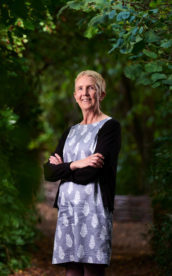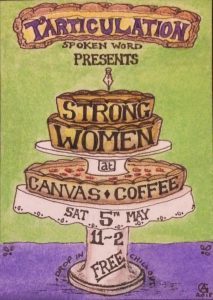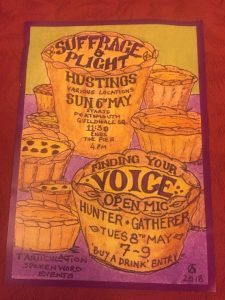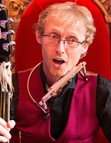William Sutton's Blog, page 15
May 15, 2018
Crime Fest Lessons #3
I enjoyed last year’s panels and interviews. And I took notes.
Thus I here offer for your delectation my 20 top tips and observations from CrimeFest 2017 panellists. See you at this year’s CrimeFest.
Keeping It Real, international thrillers panel with LA Larkin, Quentin Bates, JF Penn, Chris Ewan and Simon Toyne.
On computer cameras:
“Is everyone aware that hackers can turn your camera on?”
On politics:
“Why are crime writers left wing?”
“Our job as authors is not to write people off, but to ask how did they get to this point?”
On villains:
“A good villain is not a bad guy, but someone under enormous pressure.”
On research:
“We’re all scared of what’s on our search engines.”
Writing tips:
“Pinterest: a way to explore research visually.”
“Dialogue: read it out loud. Read the whole book: nuances, vocabulary, sound.”
On names:
“Make sure you google your names, or you may find out your hero has the same name as the Hungarian Prime Minister.”
Nor will we forget LA Larkin’s story of how she asked a vet what it felt like to sew up a wound, he told her to buy a leg of pork, and taught her to sew flesh.
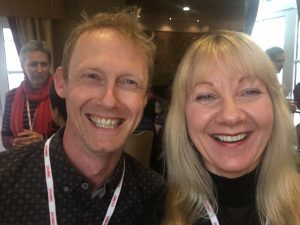

Please Feel Free to Share:









May 14, 2018
Crime Fest Lessons #2
I enjoyed last year’s panels and interviews. And I took notes. Thus I here offer for your delectation my 20 top tips and observations from CrimeFest 2017 panellists.
See you at this year’s CrimeFest.
Anthony Horowitz, author of Alex Rider, Foyle’s War, Sherlock Holmes, James Bond, TV and film writer, in interview with Barry Forshaw:
On critiques:
“My younger son is a first reader of my books: he’s vicious, and he’s always right. ‘Dad, if you publish that, I’m leaving the house.'”
On inspirations:
“As soon as I stopped writing books based on rich unhappy child syndrome, I got successful.”
On genres:
“Why so Protean?” Barry asked.
“You should always challenge yourself, keep it fresh, try different things.”
On family:
“My granny did only one kind and generous thing in her life: she died.”
On childhood:
“Inagine Versailles and the Sun King transported to 1950s Stanmore. My father was a mysterious person, not always on the right side of the law.”
On writing:
“Writing saved my life. Libraries. And books.”

Please Feel Free to Share:









May 13, 2018
CrimeFest Lessons #1
Binge-watching Shetland, I was reminded how much I loved crime critic Jake Kerridge’s interview with novelist Ann Cleeves last CrimeFest 2017 (on her receiving the Crime Writers’ Association Diamond Dagger Award for excellence in crime writing). Ann was quietly brilliant, witty, assured and self-effacing. And I took notes.
Thus I hear offer for your delectation my 20 top tips and observations from CrimeFest 2017 panellists.
See you at this year’s CrimeFest.
Ann Cleeves’ bon mots in interview:
On writing inspirations:
“It’s just being nosy – that period in autumn when it’s dark but people forget to draw their curtains… The best way of researching is on public transport.”
On love:
“There’s nothing better to get over a broken heart than Harriet Vane and Peter Lovesey.”
On research:
“I don’t really do guns, because they require too much research.”
On Vera Stanhope:
“I could see her: she looked a bit like my daughter’s French teacher; she looked more like a bag lady than a detective.”
On Brenda Blethyn:
“Sometimes I write dialogue because I know Brenda will love saying it.”
Please Feel Free to Share:









May 11, 2018
Spring Shows, Stories, Songs
It’s been a spring of shows for me.
Shout-outs for Los Dave’s Substance at Aspex Gallery, a wonderful day of artists and book-creators, where I read a couple of flash fictions.
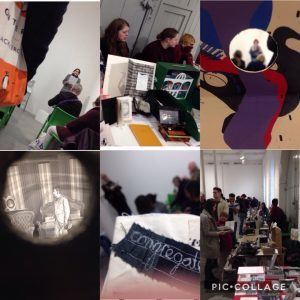
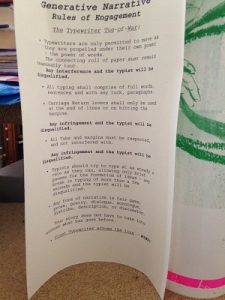
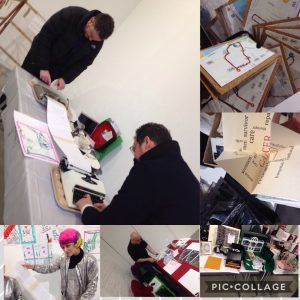
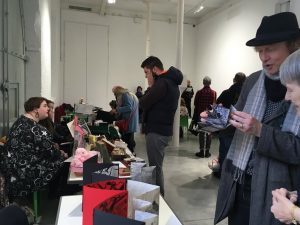
For Trump, Brexit and Beyond – A year of living dangerously – at the University of Portsmouth, with Louis Netter, Olly Gruner, Tom Sykes and more satirical politicos, I performed my Owl & Pussycat Revisited, a tale of immigrant woe.
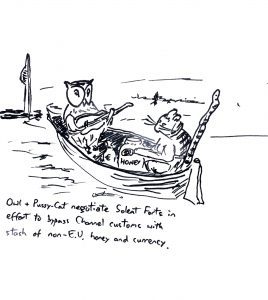
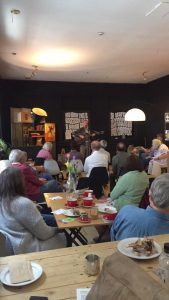
Jules Garvey-Welch’s Field Street Monologues had a triumphant visit to Southwick Church raising £700 for Rowans Hospice, with its shimmering group of monologues, including the vicar as a kinky twitcher. I sang Philip Jeays’ The Knife, my Portsmouth Fairy Tales, and a brand new song by myself and Jules, Eliza Cartwright, hot off the guitar strings. Next on in Brighton Festival, this marks the arrival of a wonderful poignantly comic writer.
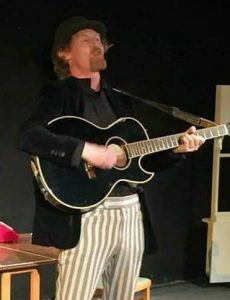
I’ve written before about
Hertha Ayrton
Strong Women and Suffrage and Plight
Valentine’s Massacre, Premature Articulation
and Emily Priest‘s You’re Welcome at Aspex Gallery
which have proved brimful of creativity and fire.
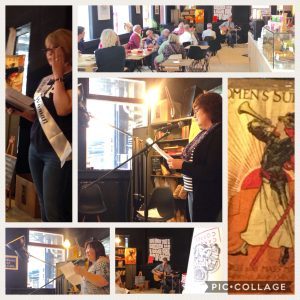
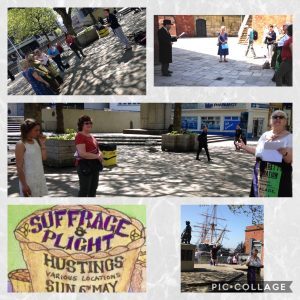
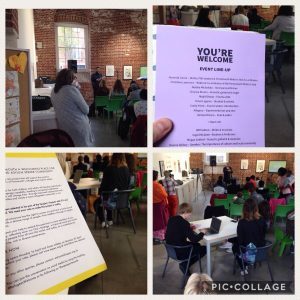
A busy spring, and a productive one. Now back to the notebooks.
Please Feel Free to Share:









May 8, 2018
“Hertha is a genius” – a song
For writers’ group Tarticulation‘s performances Strong Women and Suffrage and Plight, I have been reading and writing about Hertha Ayrton, an astonishing scientist from Portsmouth, whose impact on engineering and physics was outstanding, not to mention her other achievements in search of social justice.
It’s impossible to tell such a story within a five minute song (why do I also do a song? – because prose would have been harder).
So I’ve rattled through Hertha’s achievements, coming from a Polish-Jewish immigrant family through Girton College, Cambridge, to become the first female member of the Institute of Electricial Engineers, recommended for the Royal Society (rejected on gender grounds), inventor (26 patents), researcher widely published, promoter of women’s suffrage funding and helping militant protestors, and developing two inventions that contributed to the British effort in the first World War.
I hope to convey some of the warmth felt by those who knew her, and the inspiration she has provided to later scientists.
Lyrics below, with footnotes and bibliography, and Soundcloud audio to follow.
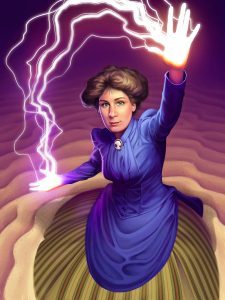
Hertha in George Doutsiopoulos‘ epic illustration for engineering heroes game: more here
Hertha: The origin and achievements of the remarkable Hertha Ayrton
[a song, with Victorian Powerpoint flipchart, with diagrams, pictures & explanations]
In 1874 of the students accepted into the University of Cambridge, I’m certain,
None was destined to become as famed as a science undergraduate at Girton,
Who on the mysteries of arc lights & ripple patterns drew back the curtain.
I need go no further
For you all know Hertha.
Heckler 1: No, go further.
Heckler 2: Never heard of her!
[astonished] Not heard of her Hertha?
Who studied science when few women cared to,
Experimented in places men wouldn’t have known where to,
Housed Suffragettes others wouldn’t dare to,
Wooed and won her professor, name of Will Ayrton (– that’s me).
It’s only fair to serenade my brilliant wife.
I beg your leave to sketch the story of her (coruscating) life.
Heckler 1: By all means, Professor.
Heckler 2: Pls be our guest, sir. At your behest, sir.
[tip hat, bow, take drink of water, take deep breath]
Born Phoebe Sarah Marks, Polish Jewish immigrants’ eldest daughter,
Father died, left 8 kids so Mother seamstressed to support them,
Declaring girls need education more than boys, she fought for
Sarah to join her aunt’s progressive school in London, leaving Portsea.
Self-sufficient governessing at 16 she couldn’t work harder,
Showing hunger for scholarship and for justice equal ardour.
She founded Girton’s Fire Brigade
Her friendship with George Eliot indubitably influenced shrewish Jewish character Mirah in Daniel Deronda.
Always the most striking figure among the students,
For pulse measuring sphygmograph & line divider she filed patents.
Modestly passing her exams
Catching the eye of her professor at Finsbury Technical College (– that’s me).
After our marriage she took up my abandoned work on arc lights hissing:
To eradicate their eccentricities made it her mission.
Wrote up her experiments in articles published in The Electrician.
Stabilised the arc light by ensuring that oxygen is missing.
At Institute of Electrical Engineers, first female to read a paper
Then a member. Refused (despite all plaudits) by the Royal Society.
Gazing at ripples in the sand led her to study vortices & oscillations,
Which come the war gained her deserved notoriety.
A marching Suffragette, against prejudice she railed,
She hosted Mrs Pankhurst and comrades coming out of jail.
Women scientists’ work ascribed to their husbands roused her fury.
On a convalescent visit we welcomed incognito her penfriend Marie Curie.
Why so much fuss about her scientific feats abstruse?
Because she made them remarkably relevant at the outset of World War I:
Our searchlights transformed for reliable prolonged patriotic use,
Poisoned gas dispersed from trenches by 100,000 of her Ayrton Flapper fans.
So celebrate this legendary scientist of her scene with us.
Like me, you must feel privileged she should’ve been with us.
As I remarked to her uncle Joseph Harzog,
“You and I are capable people, but Hertha, Hertha is a genius.”
[repeat until fade] Hertha, oh, Hertha is a genius.
Hertha Footnotes
Cambridge did not award degrees to women until 1948.
Her friend Ottilie Blind renamed her after the heroine of Fredrika Bremer’s 1856 novel Hertha, which protested unmarried women’s status as incompetent wards of their male relatives.
She founded UK’s first all-female Fire Brigade. She was its first captain, after proving to a doubting Metropolitan fireman that she could shin up a ladder.
Without access to academic or business apparatus, she set up experiments in her front room.
She registered 26 different patents:
As a student she made a sphygmograph – for recording the pulse in arteries.
Her line-divider divided lines into equal parts, essential for artists, architects and engineers.
First woman to present a paper to the Institution of Electrical Engineers, 1899.
Elected to full membership two days later.
Arc lights: electric arcs produced bright light, a high-voltage discharge heating carbon electrodes and gas between them white-hot.
Hertha experimented with pressure, voltage and length of arc, identifying troublesome hissing noise as oxidation.
Institution of Electrical Engineers invited her to read a paper in 1899, first ever by a woman. First woman elected to membership.
At the International Congress of Women, held in London in 1899, Hertha presided over the physical science section. After she spoke at International Electrical Congress (Paris 1900), the British Association for the Advancement of Science allowed women to serve on committees.
She published The Electric Arc in 1902.
First woman to read her own paper to the Royal Society in 1904. Refused membership as a married woman. Received nonetheless the Hughes Medal, for original discovery, for her work on ripples and electric arcs.
From her remarkable and elegant essay, The origin and growth of the ripple-mark: The solution of the problem cost me several weeks of observation and experiment, yet it was absurdly simply when it came to me. It was that a single ripple, existing alone, in otherwise smooth sand, initiates a ripple on either side of it, that each of these ripples produces another on its farther side-these in turn originate on their farther sides, and so on, till the whole sand is ripple-marked.
Hertha was a close friend of Marie Curie. When her discovery of radium was attributed to her husband, Hertha campaigned in the press:
“Errors are notoriously hard to kill, but an error that ascribes to a man what was actually the work of a woman has more lives than a cat.
Legacies:
Her seminal work on arc lamps improved positioning of carbons, preventing hissing.
Taken up by the British Admiralty, this regulated the efficacy and life of searchlights for illuminating enemy craft.
She designed improved carbons and lamp houses for cinema projectors.
Last October Sheffield Hallam University launched its STEM Centre. #STEM #STEMed
Her original contributions to hydrodynamics she then applied to air vortices. Despite unenthused uptake by the army, 100,000 Ayrton fans saved lives by dissipating poison gas from the trenches.
Active in Suffrage Societies and Women Social & Political Union, she visited Parliament with Emmeline Pankhurst and Elizabeth Garrett Anderson. In 1912 the government intended to seize the assets of the WSPU; Hertha laundered the funds to safety. “Unable to be militant, from reasons of health, as I believe in the necessity for militancy, I give every penny I can afford to the militant union that is bearing the brunt of the battle, namely the WSPU.”
Her concrete approach and analytical style was remarkable from her social & educational background, appropriate for an engineer, and influential.
She is increasingly a role model for other women to show that professional doors can be opened:
Percentage of female engineers in the UK has risen sharply in the last two years – up to 11%.
While 9?% of boys study a maths or science GCSE, ??% of girls do.We need engineers. #WomeninSTEM #YoE #inspireanengineer #WIRI #WomensHistoryMonth
Her daughter Barbara (of whom she was proud when arrested as Suffragette) entered Parliament in 1945 as a Labour MP.
Quick Introductions
Objectivity #56 (2016). The Fight for Fellowship (Hertha Marks Ayrton). Retrieved from https://youtu.be/Y175lZlYmYU
Great Lives Series 44 (2/1/2018). Hertha Ayrton. Retrieved from https://www.bbc.co.uk/programmes/b09k6pn1/broadcasts
http://cwp.library.ucla.edu/articles/ayrton/ayrtonbio.html
http://www.theiet.org/resources/library/archives/biographies/ayrtonh.cfm
http://metro.co.uk/2016/04/28/hertha-marks-ayrton-inventions-facts-and-biography-of-the-electric-arc-scientist-5846560/?ito=cbshare
http://www.deepseanews.com/2016/04/the-origin-of-ripples-and-other-fantastic-fluid-experiments-by-hertha-marks-ayrton/
https://royalsociety.org/science-events-and-lectures/2013/hertha-ayrton/
http://spartacus-educational.com/Wayrton.htm
https://jwa.org/encyclopedia/article/ayrton-hertha-marks
https://www.lavozdegalicia.es/video/informacion/2016/04/27/vida-hertha-marks-ayrton/00311461783922176520867.htm
http://womenyoushouldknow.net/engineer-mathematician-physicist-inventor-hertha-marks-ayrton/
http://family.ray-jones.org.uk/rootspersona-tree/phoebe-sarah-hertha-marks/
Bibliography
Sharp, Evelyn. Hertha Ayrton: A Memoir. London: 1926.
Appleyard, Rollo. The History of the Institution of Electrical Engineers. London: 1939;
Crawford, Elizabeth. The Women’s Suffrage Movement: A Reference Guide 1866-1928. London: 1999;
Girton College Register, 1869-1946;
Hirsch, Pam. Barbara Leigh Smith Bodichon: feminist, artist and rebel. London: 1998;
Mason, Joan. “Hertha Ayrton and the Admission of Women to the Royal Society of London,” Notes and Records of the Royal Society. London: 1991.
Ayrton, Hertha. The Electric Arc. London: 1902;
Ayrton, Hertha. “The origin and growth of ripple-mark.” Proceedings of the Royal Society of London. Series A, Containing Papers of a Mathematical and Physical Character84, no. 571 (1910): 285-310.
Ayrton, Hertha. 1915. “Local Differences of Pressure Near an Obstacle in Oscillating Water”. Proceedings of the Royal Society of London. Series A, Containing Papers of a Mathematical and Physical Character91 (631). The Royal Society: 405–10. http://www.jstor.org/stable/93511.
Ayrton, H.. 1926. “Primary and Secondary Vortices in Oscillating Fluids: Their Connection with Skin Friction”. Proceedings of the Royal Society of London. Series A, Containing Papers of a Mathematical and Physical Character113 (763). The Royal Society: 44–45. http://www.jstor.org/stable/94582.
Ayrton, Hertha. 1919. “On a New Method of Driving Off Poisonous Gases”. Proceedings of the Royal Society of London. Series A, Containing Papers of a Mathematical and Physical Character96 (676). The Royal Society: 249–56. http://www.jstor.org/stable/93844.
Ayrton, Hertha. 1908. “On the Non-periodic or Residual Motion of Water Moving in Stationary Waves”.Proceedings of the Royal Society of London. Series A, Containing Papers of a Mathematical and Physical Character80 (538). The Royal Society: 252–60. http://www.jstor.org/stable/92896.
Endnotes
Without access to academic or business apparatus, she set up experiments in her front room.
Her friend Ottilie Blind renamed her after the heroine of Fredrika Bremer’s 1856 novel Hertha, which protested unmarried women’s status as incompetent wards of their male relatives.
She founded UK’s first all-female Fire Brigade. She was its first captain, after proving to a doubting Metropolitan fireman that she could shin up a ladder.
She registered 26 different patents: as a student she made a sphygmograph – for recording the pulse in arteries; her line-divider divided lines into equal parts, essential for artists, architects and engineers.
Cambridge did not award degrees to women until 1948.
She published The Electric Arc in 1902.
Hertha experimented with pressure, voltage and length of arc, identifying troublesome hissing noise as oxidation.
First woman to read her own paper to the Royal Society in 1904. Refused membership as a married woman. Received nonetheless the Hughes Medal, for original discovery, for her work on ripples and electric arcs.
From her remarkable and elegant essay, The origin and growth of the ripple-mark: The solution of the problem cost me several weeks of observation and experiment, yet it was absurdly simply when it came to me. It was that a single ripple, existing alone, in otherwise smooth sand, initiates a ripple on either side of it, that each of these ripples produces another on its farther side-these in turn originate on their farther sides, and so on, till the whole sand is ripple-marked.
Active in Suffrage Societies and Women Social & Political Union, she visited Parliament with Emmeline Pankhurst and Elizabeth Garrett Anderson. In 1912 the government intended to seize the assets of the WSPU; Hertha laundered the funds to safety. “Unable to be militant, from reasons of health, as I believe in the necessity for militancy, I give every penny I can afford to the militant union that is bearing the brunt of the battle, namely the WSPU.”
Hertha was a close friend of Marie Curie. When her discovery of radium was attributed to her husband, Hertha campaigned in the press: “Errors are notoriously hard to kill, but an error that ascribes to a man what was actually the work of a woman has more lives than a cat.
Her original contributions to hydrodynamics she then applied to air vortices. Despite unenthused uptake by the army, 100,000 Ayrton fans saved lives by dissipating poison gas from the trenches.
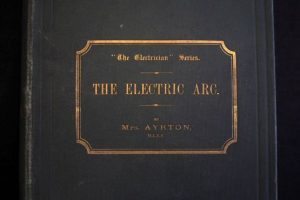
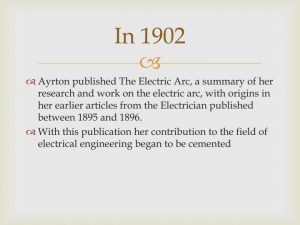
Hertha’s first impressive advancements, solving the problem of hissing arc lamps
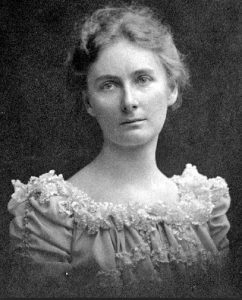
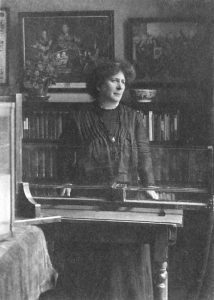
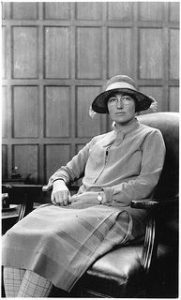
Hertha young, experimenting, older

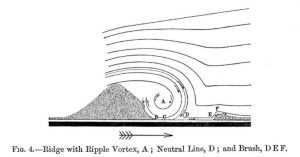
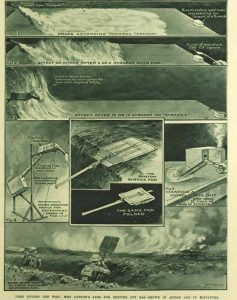
Hertha’s work on ripple patterns, oscillations, first in hydrodynamics, then applied to air, for clearing trenches of gas
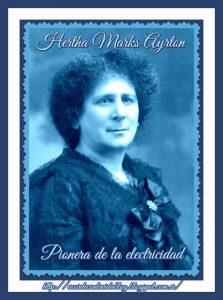
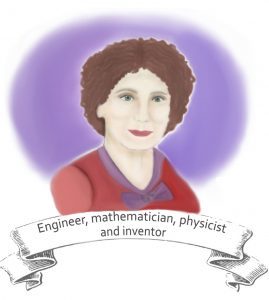
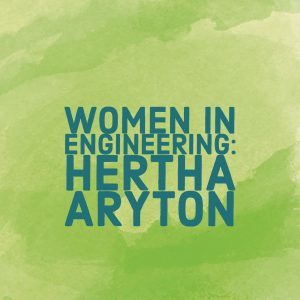
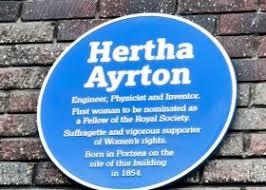
Hertha commemorated
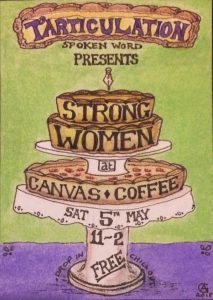
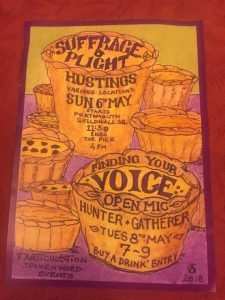
Please Feel Free to Share:









T’Articulation writers’ collective
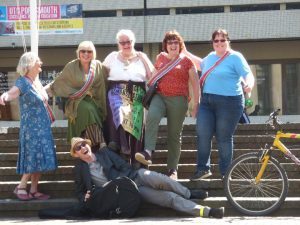
It is with joy that I see T’Articulation, Portsmouth‘s newest writing collective venture, taking up the baton of writer-performances and sprinting off with it. Here are some shots of our events Strong Women and Suffrage & Plight, celebrating 100 years since the (partial) broadening of the franchise to include some women.


Named through a concatenation of articulacy, Premature Articulation and the pastel de nata tarts of Casa de Castro on Albert Road (where they meet to plan their ventures), they are fostering writers, poets, songsmiths and all types of storytelling.
The events so far have been strong, promoting stories from the poignant to the picturesque, from the ridiculous to the heart-wrenching, and connecting writers with each other, with audiences, and with our flourishing cafe/artistic culture here in Southsea.

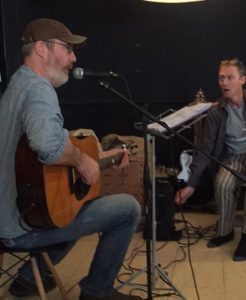
They’ve already taken charge of Valentine’s Massacre, Premature Articulation, and Day of the Dead in Portsmouth Darkfest; they’ve helped out with Typewriter Tales, and they’ve hosted and planned more events at Hunter Gatherer, Southsea Coffee and Canvas Coffee. Thanks to the team for such vibrant welcoming energy.
Watch this space for shows to come.
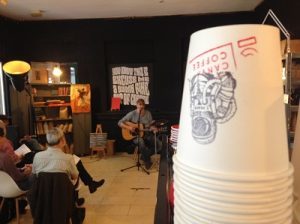
Please Feel Free to Share:









May 5, 2018
September, a Premature Articulation
My performance in Premature Articulation, Portsmouth Bookfest 2018 (including a failed attempt to sing a song about a whale). At this spoken word event, which my Portsmouth Writers Hub friends and I cooked up, with the help of Pravin, Polly and all at Canvas Coffee, I always end up singing.
Here’s a song writ long ago channelling the old jazz lyricists and the new blues. Thanks to AJ Noon for the video: https://www.youtube.com/channel/UCmto...
September
(William George Q)
Now the cards are played
and September has turned,
watch the colours fade
in the leaves crying out to be burned.
Now that you are going
and I’m stuck right here,
autumn winds are blowing
so exit the year.
September
Blowing in strong.
September song.
The stars have gone AWOL.
The moon’s she’s a fake.
My eyes have gone haywire,
and my lips still ache.
The swallows’ departing
Leaves no birds to sing
This pain in my heart now
Says “So long till spring.”
September’s
Blowing in strong.
September song.
Tell me where shall I go?
Tell me how shall I know
where I’m going if you don’t go as well?
When I go, tell me where else can I go?
If I don’t go with you,
I might as well go straight to hell.
(Do not pass go/collect £200)
The night-watch is ending.
The coffee’s too drunk.
The moon she’s descending
and into the sea we’re all sunk.
Shadows of the dawn
come and whisper your name,
tell me you’ll return,
Saying “No-one’s to blame.”
Just September,
Got to stay strong.
September Song.
September, October,
November, December,
Oh, baby, now don’t be too long.
Please Feel Free to Share:









May 1, 2018
Hertha Ayrton, Strong Women
She hosted Mrs Pankhurst and comrades coming out of jail.
Women scientists’ work ascribed to their husbands roused her fury,
& on a convalescent visit we welcomed incognito her penfriend Mme Marie Curie.”
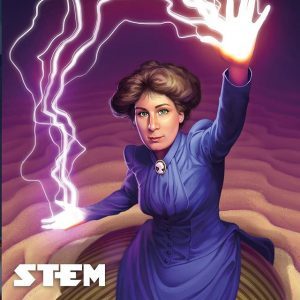
Hertha in George Doutsiopoulos‘ epic illustration for engineering heroes game: more here
For Strong Women on Saturday from 11am till mid-afternoon at Canvas Coffee Shop, a song/spoken word event from T’articulation, I shall be singing my new ditty:
Hertha: origin & achievements of the remarkable Hertha Ayrton, with diagrams, scientific footnotes, assorted heckles, & bibliography,
as friends roll into town for Portsmouth Comic Con – Portsmouth Guildhall.
Stop in for an excellent coffee and let us serenade you.
Sunday 6 May from 11.30 we will be traipsing the city’s streets, seeking suffrage and lamenting past plights, performing hustings-style at locations scattered: follow the Facebook event page for information: #WomeninStem #STEM
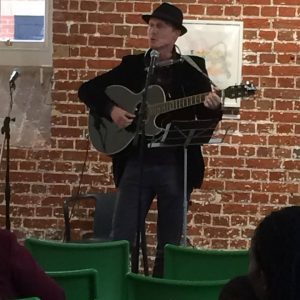
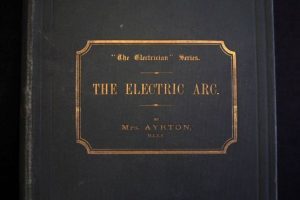
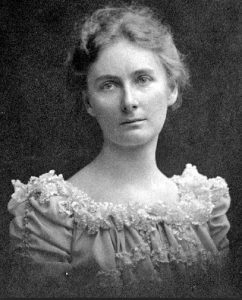
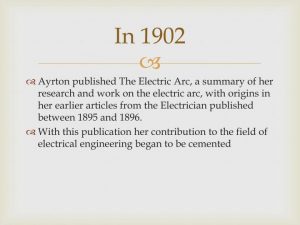
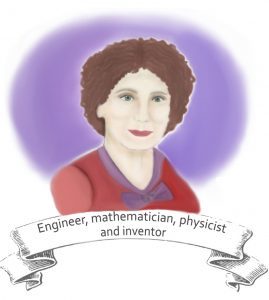
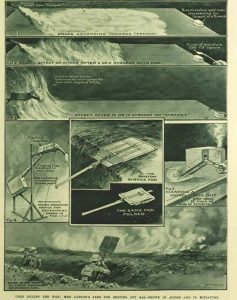
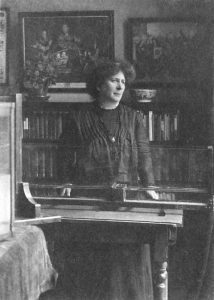
The Ayrton Flapper Fan & Hertha experimenting in her front room
I am sending scientific cabaret guru Helen Arney a scratchy recording of my Hertha song during the week for peer review. I heartily recommend her episode of BBC Radio 4‘s Great Lives as an introduction to this inspirational Portsmouth scientist and campaigner.
“Helen Arney, self confessed science nerd, stand-up entertainer, and once nicknamed a “geek songstress”, tells Matthew Parris why she’s chosen Hertha Marks Ayrton, the pioneering Victorian physicist, inventor and suffragette, as her great life. Ayrton, we hear, was the first woman to be admitted into membership of what is today known as the IET, the Institution of Engineering and Technology. Their archivist Anne Locker knows Ayrton’s life and works and fields the questions from Matthew and Helen.
They talk about how Hertha (1854-1923) overcame considerable obstacles to be the first woman who was proposed for the fellowship of the Royal Society. Her candidature was refused on the grounds that as a married woman she had no legal existence in British law. This did not stop her from patenting over 20 of her inventions, which included a large electric fan designed to disperse mustard gas from the Trenches during the First World War. Fascinated by electricity, her achievements also ranged across mathematics and physics.
Helen Arney, who’s one third of the Festival of the Spoken Nerd, the comedy group that makes science entertaining for audiences, explains why she’s championing Ayrton. Hertha’s father was a Jewish immigrant, a watchmaker from Poland, who hawked goods at markets. Nonetheless, Hertha was among the first generation of women to study at Girton College, Cambridge.”
Please Feel Free to Share:









Circumnavigating Portsea
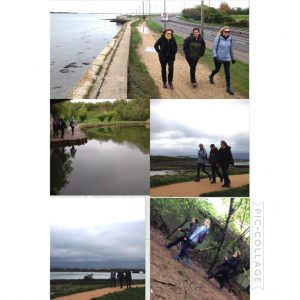
An unexpected monument, Hilsea Lines, hidden nature
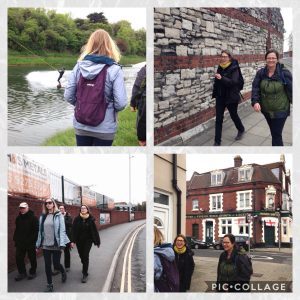
Dockyard walls, a local gent
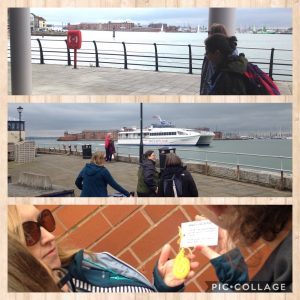
Aspex’s #Welcome project yarn bomb discovery
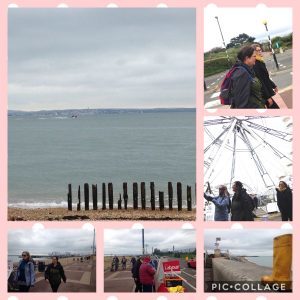
Weatherbeaten groynes, abandoned boot and Rose Garden
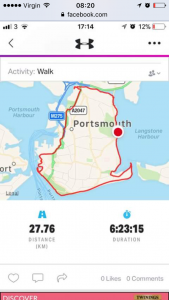
Please Feel Free to Share:









April 30, 2018
#RefugeesWelcome Owl & Pussycat (Visa Denied)

I was particularly struck by Donna Jones MBE‘s pieces about encounters on the Isle of Wight, and by Shormila of the Red Cross’s myth-busting of the real (astonishingly low) figures of asylum seekers in the UK and here in Portsmouth. Well done to Omar Lagares and Emily for declaring #RefugeesWelcome here.
For my own piece, I’ve dug up some problems for my favourite poet and travel writer Edward Lear’s famous Owl & Pussycat, who of course should have filled in spouse visa application forms well in advance of travelling.
Owl + Pussy-Cat #Revisited
(William Sutt
on, with apologies to Edward Lear)
The Owl and the Pussy-cat went to sea
In a government subsidised ferry
With dreams of Quorn mince served with M&S quince,
And prosecco to make the guests merry.
The Owl filled out Puss’s visa form,
And sang to a small guitar,
‘O lovely Pussy! O Pussy, my love,
What a well-travelled Pussy you are,
You are,
You are!
What an exotic Pussy you are!’
They cross-questioned the Owl, leaving Puss there just scowled.
“So. How long does this ‘spouse’ plan to visit?”
“But if we are marrying, what limit to tarrying?”
“This collar – engagement ring, is it?”
They detained them all day, separate cells, no parlay,
Checked their bags and identifications,
Summoning down to the centre that well-known dementor,
The Home Office Rep for Immigration,
migration, privation, devotee of repatriation.
‘What you got in them paws? Are you travelling with claws?
‘Must you really so frantically frisk us?’
‘E’er suffered a seizure? Let’s see this spouse visa.
Seek asylum?’ Growled Puss, ‘Off my whiskers.’
‘To prove love genuine, provide pics, Valentine’s,
Love poems – and bank account flush, mate.”
So they stamped her REMOVE, pending Owl’s chance to prove
Available maintenance funds equivalent to a minimum gross annual income of £18,600 per annum,
each time the migrant applies for temporary leave to remain as a family member,
and once eligible for Indefinite Leave to Remain (usually after five years),
Government requirements supporting integration & preventing burdens on taxpayers.
So the Owl is no slob, and he slaves at his job.
Gets his Government Gateway Tax Number
Fills the forms in online, till it beeps Out of Time.
His USER password? – Can’t remember.
Keep on planning their marriage. Th’Home Office miscarriage
Of justice just bureaucrat’s muddle.
If he keeps slaving hard, he’ll earn her that green card
And she’ll one day escape Calais’ jungle
They’ll struggle,
Or else smuggle,
Her in through that dark Eurotunnel.
So those M & S aisles, Owl stacks up with sad smiles
Shifting gherkins, jerk chickens, & Turkey.
Fears employer harassment, has no health assessment:
On zero hours contract he’s working.
Before his paychecks, tumbling box of Nik-Naks
Sends him to Accident & Emergency.
He texts Puss in frustration: “Need wing operation:
Three months wait for non-emergency,
Though it hurts, you see,
Jeremy Hunt, he
Says, ‘No crisis in NHS, you see.’
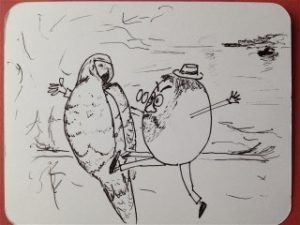
Puss replies, “Don’t be silly, Owl, claim Disability.
Government will pay your rental.
The DWP don’t accept his sick note
& the forms they are driving him mental.
With Owl’s broken wing, can’t play guitar nor sing
Then his rent doubles with Bedroom Tax.
Soon he’s out on the street, no bed, nothing to eat,
Sleeping reough mid delinquents on smack
From tic-tacs
And Kit-Kats
And Nik-Naks
All so far from his wedding day tasks.
So he goes helter-skelter twixt rough sleep and shelter
Subsists on food banks and soup kitches
With no home address, his sick claim’s in a mess
And this country they dreamed they’d be rich in!
He’s collapsed to his knees, by a pub where TVs
Blare a broadcast of power strong and stable
Never cursing his foul treatment, finally Owl
He is threatening to croak on the pavement
So brave –
And they save him!
No, he dies on the operating table.
Still dreaming of marriage, Puss hallucinates a carriage
To escape the refugee Jungle
Disdaining all laws she will cling by her claws
As it whisks her through the Eurotunnel.
She subsists on cheap cider, her French pimps provide her
to drink with a runcible spoon:
Lunedi to dimanche, by the edge of the La Manche
She gets tight by the light of the moon,
Oh, la lune,
None too soon,
How she swoons,
She lies down and she’s drowned neath the moon.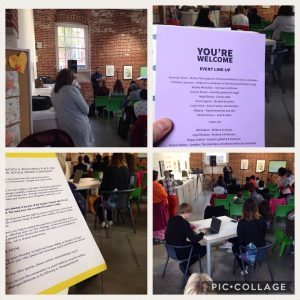
Please Feel Free to Share:










